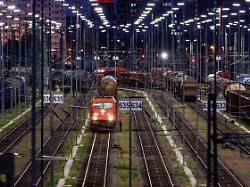High losses alarm Brussels
DB Cargo must fear being broken up
February 14, 2024, 5:38 p.m
Listen to article
This audio version was artificially generated. More info | Send feedback
Deutsche Bahn has been making high losses with its freight traffic for years. This year the minus is once again massively above expectations. Insiders report that the EU Commission could pull the emergency brake due to distortion of competition.
According to company circles, the year-long crisis in Deutsche Bahn’s freight division is coming to a head. DB Cargo will report a loss of almost half a billion euros for 2023, said people familiar with the figures. This is around twice as high a loss as expected and promised to the EU Commission. This has initiated an investigation into distortion of competition.
The EU no longer wants to accept that the Deutsche Bahn Group has been compensating for the high losses of the freight railway for years. The railway’s planning had repeatedly held out the prospect of a turnaround, which never materialized. In view of the EU pressure, the group now wants to get serious and outsource parts of its business. According to employee representatives at DB Cargo, around 2,000 jobs are at risk.
Minus cannot be explained by a lack of demand
As a former near-monopoly, DB Cargo has rapidly lost market share in recent years and now accounts for less than half of rail freight transport. The minus is not due to a lack of demand. For example, military transport for Ukraine on behalf of the USA and the Bundeswehr is lucrative, said company representatives. However, single-wagon traffic causes chronic losses, as trains with a few wagons each have to be laboriously put together. The federal government supports this with around 300 million euros per year, but it doesn’t seem to be enough to turn the trend around.
On the other hand, aid for route prices has been cut in the 2024 budget. According to company representatives, this will result in the costs of using the tracks for freight transport increasing by a double-digit percentage. This means that the freight railways are losing further ground in the battle with trucks. The political requirement, also for climate protection reasons, is that the railways should achieve a freight market share of 25 percent by 2030. It is currently around 19 percent and has only increased slightly in recent years.
Brussels has made an example of French railways
The federal government and the railways have the example of the French state railway SNCF in mind: Here, too, the freight railway made constant losses – until the EU Commission decided that the division had to open itself up to investors and hand over parts of its transport to competitors. “This means that the freight railway is effectively broken up,” says one person involved in the talks with the EU Commission.
The EU Commission declined to comment on the ongoing proceedings. The railway did not want to comment on the cargo loss or the EU’s actions. The Ministry of Transport spoke of a constructive exchange with the Commission. With the support of the federal government, Deutsche Bahn wants to prevent such a scenario at all costs, because DB Cargo is still very important for transport policy and climate goals. Parts of the industry such as the steel and automobile sectors are also interested in a functioning freight railway with single-car traffic.
A restructuring concept that convinces the Commission is now all the more urgent. The group is pushing for more flexibility. Last year, freight railway boss Sigrid Nikutta had already drawn up a concept that primarily envisaged the outsourcing of traffic to subsidiaries as well as cuts in administration. The resistance from employee representatives around the Railway and Transport Union (EVG) is great. However, nobody wants to risk DB Cargo being broken up here either.
